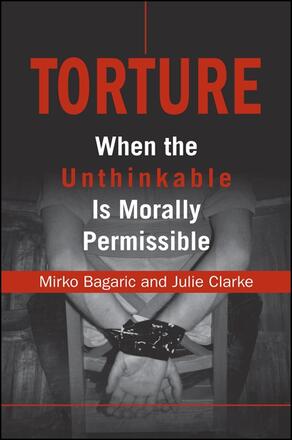
Torture
When the Unthinkable is Morally Permissible
Alternative formats available from:
Argues that there are moral grounds to use torture where the lives of the innocent are at stake.
Description
The "war on terror" has brought the subject of torture to the forefront of public attention. In contrast to other discussions that focus narrowly on the practice of torture, and condemn it under any and all circumstances, Mirko Bagaric and Julie Clarke argue that to take this position is to live in a moral vacuum. The subject of torture causes our emotions to conflict with our reason. When we have a choice between saving the life of an innocent person, and not harming a terrorist or other wrongdoer, it is indecent to absolutely prefer the interests of the wrongdoer. In contrast, they propose a moral standard where each individual's interest counts equally. Within this standard, the ostensibly brutal act of torture may be permissible if it has the potential to achieve compassionate outcomes in the form of saving innocent lives.
At Deakin University in Australia, Mirko Bagaric is Professor of Law and Julie Clarke is Lecturer in Law. Bagaric's books include How to Live: Being Happy and Dealing with Moral Dilemmas and Clarke's include (with P. Clarke and N. Courmadias) Butterworths Casebook Companions-Contract Law.
Reviews
"This brief, highly readable book makes the moral case for the use of torture, developing arguments along both philosophical and pragmatic fronts … There is a lot to disagree with in this book, but it is a must read for students and scholars wishing to engage the torture debate. Excellent for collections on ethics, law, terrorism, and criminal justice. " — CHOICE
"Bagaric and Clarke offer a forthright defense of a practice whose proponents often resort to euphemism. " — New York Times Book Review
"I like several things about this book—first and foremost the courage of the authors. I know that the positions they have taken have been lambasted by many, often in a personal attack. I happen to disagree with much that has been said in the book. But I do believe they should be allowed to state their position. Many civil libertarians argue that to even debate the validity of torture is reprehensible—that there are some issues that should not be debated, like genocide, slavery, and…torture. " — Marcy Strauss, Loyola Law School in Los Angeles
"Among this book's many virtues is the way in which the book avoids tangents and drives relentlessly onward in making its points. It is a controversial, provocative, and important book. " — John T. Parry, Lewis & Clark Law School